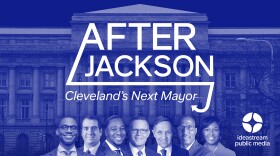One of the topics put to candidates in Tuesday night’s Cleveland Mayoral Debate was racial equity in the city.
A specific question about hate against Asian American and Pacific Islanders (AAPIs) prompted the seven candidates to discuss the nationwide Stop Asian Hate movement.
Questions for the candidates were delivered by members of the community, who videotaped themselves asking questions.
“What will you do to ensure that the Asian American community is represented in your administration?” Ray Hom asked. “What will you do to ensure that the AAPI community is protected from anti-Asian hate crimes and discrimination?”
Several candidates discussed the need to require racial equity and bias training for city employees.
Cleveland City Council President Kevin Kelley said he would require bystander intervention training for city employees.
Nonprofit executive Justin Bibb said he would hire a chief racial equity officer to ensure proper racial equity oversight in decisions made at City Hall. He also said he would ensure AAPI representation in his cabinet.
“I want to make sure I’m grounding my policy making as the next mayor in the lived experiences of our residents,” Bibb said.
Attorney Ross DiBello said allowing “unfettered public comment” at Cleveland City Council meetings would give local AAPI advocacy organizations a stronger voice in influencing public policy.
Former Cleveland Mayor Dennis Kucinich proposed a U.S. Department of Peace as a U.S. Congressman in 2001 and said he would bring something similar to City Hall.
“We can actually use Cleveland as a place that can show the whole country that we can be a more peaceful city,” Kucinich said.
Local organizers put together a Stop Asian Hate march through Cleveland's AsiaTown last spring. [Gabriel Kramer / 91����]
Former Ward 2 councilman Zack Reed and current Ward 7 councilman Basheer Jones boasted the relationships they’ve built with minority communities and the fact they both attended a locally organized Stop Asian Hate march in Cleveland’s AsiaTown – which sits in Jones’ ward – last spring.
In March, Cleveland City Council passed an emergency resolution – which was introduced by Jones – to condemn racism, xenophobia and hate crimes “especially against Asians and Asian American Pacific Islanders during this pandemic.”
“We will do more business with every minority,” Jones said. “Economic opportunity is the thing that will destroy racial inequity.”
State Senator Sandra Williams said training sessions were too lax to be a sufficient solution to solving the city’s issues of racism. She also noted that racism toward Asian Americans began well before the COVID-19 pandemic started.
Last month, Illinois lawmakers requires public schools to teach Asian American history. Illinois is the first state to make such a requirement, but AAPI communities in Ohio are pushing for similar legislation.
In a post-debate interview, Williams said she would work with the Cleveland Metropolitan School District to ensure that Asian American history would be taught in local schools.
“I think we’re getting a one-sided view when you’re going from K-12, about what Ohio’s history is really like,” Williams said.
Williams said she opposed the two by the Ohio House that would ban Critical Race Theory education.
The US Census Bureau estimates that Cleveland’s Asian population makes up less than three percent, but Asian Americans in Cleveland have been vocal as the violence against those in the AAPI community increased nationwide over the last 18 months.
Demonstraters join a 'Unity Against Hate' rally at Downtown Cleveland's Public Square on May 2021. [Gabriel Kramer / ideastream]
The debate Tuesday was the first of two mayoral debates coordinated by 91���� and the City Club of Cleveland ahead of the Sept. 14 primary.
The debates are hosted by 91���� at the Idea Center in Cleveland's Playhouse Square. Other partners include the Press Club of Cleveland and the Northeast Ohio Solutions Journalism Collaborative.









